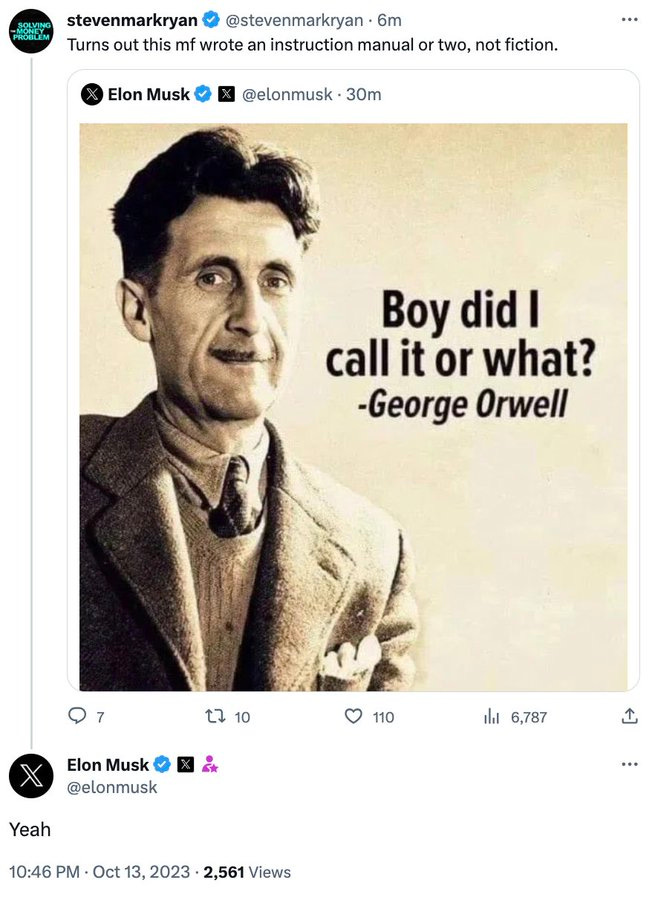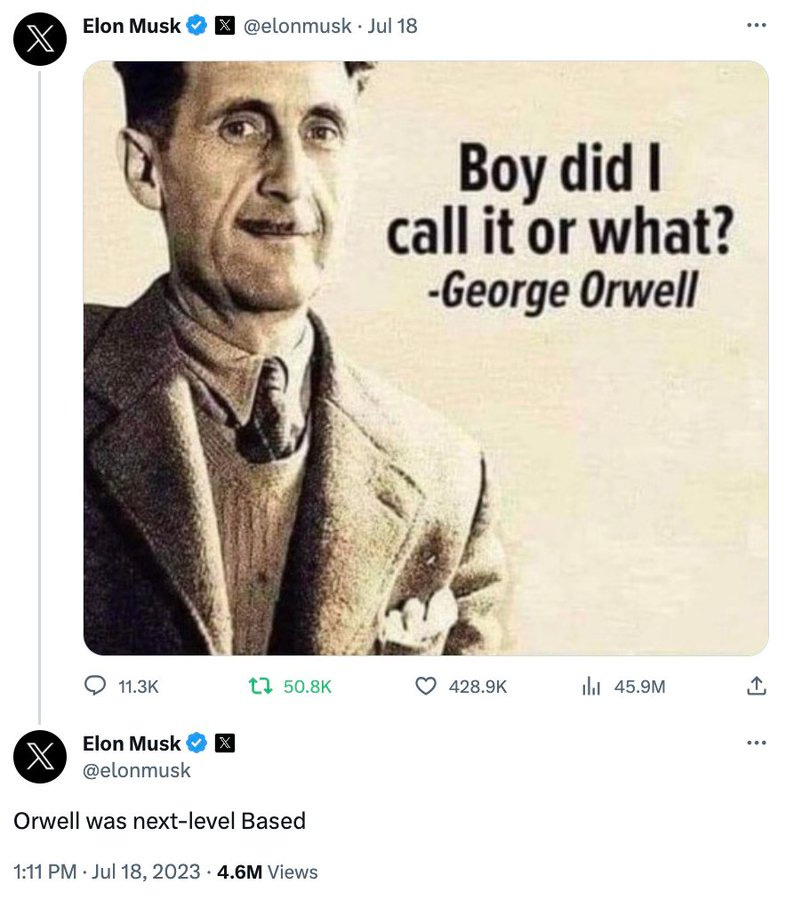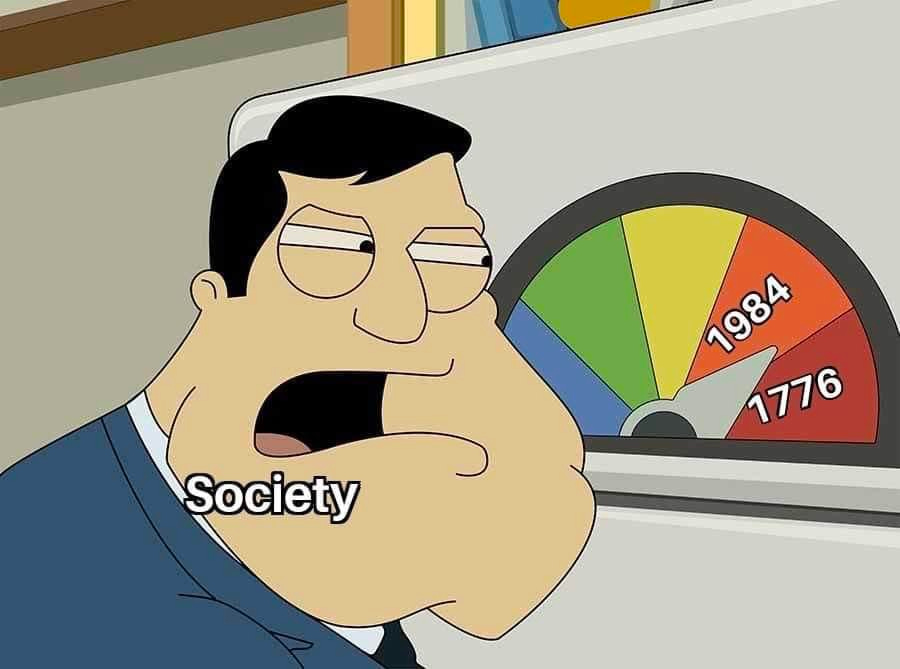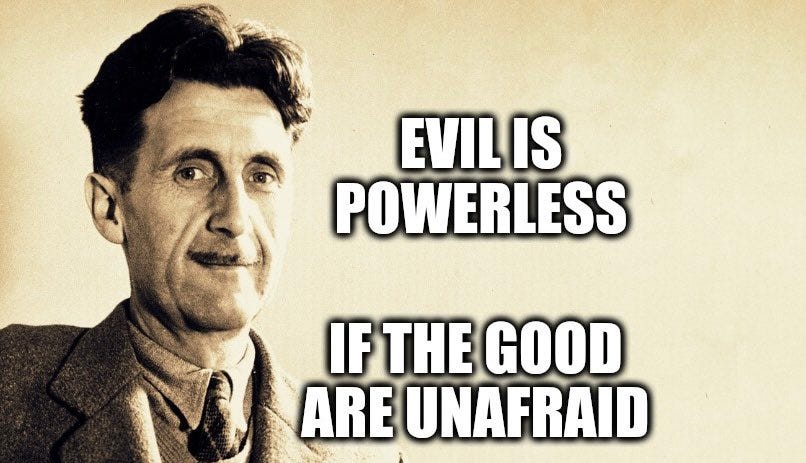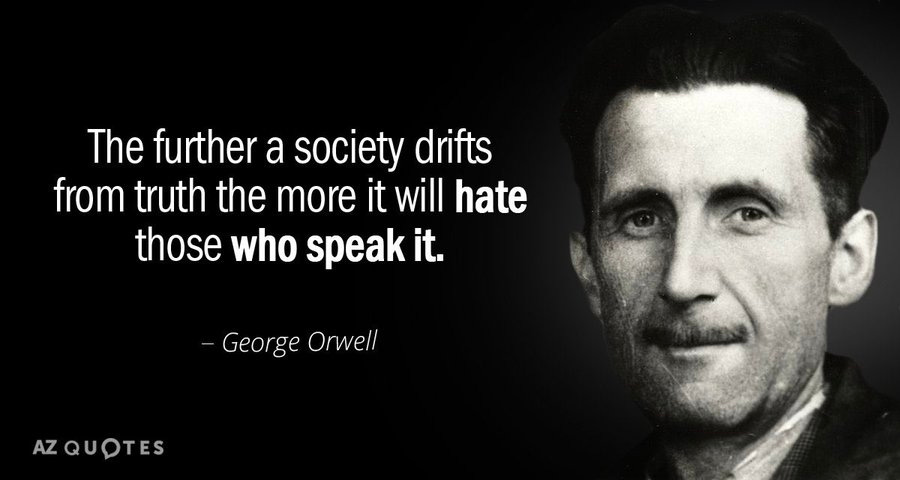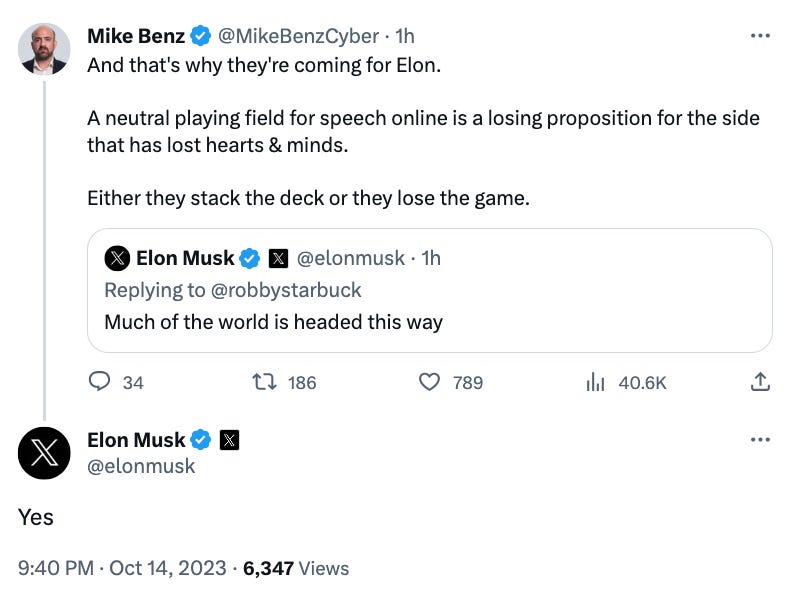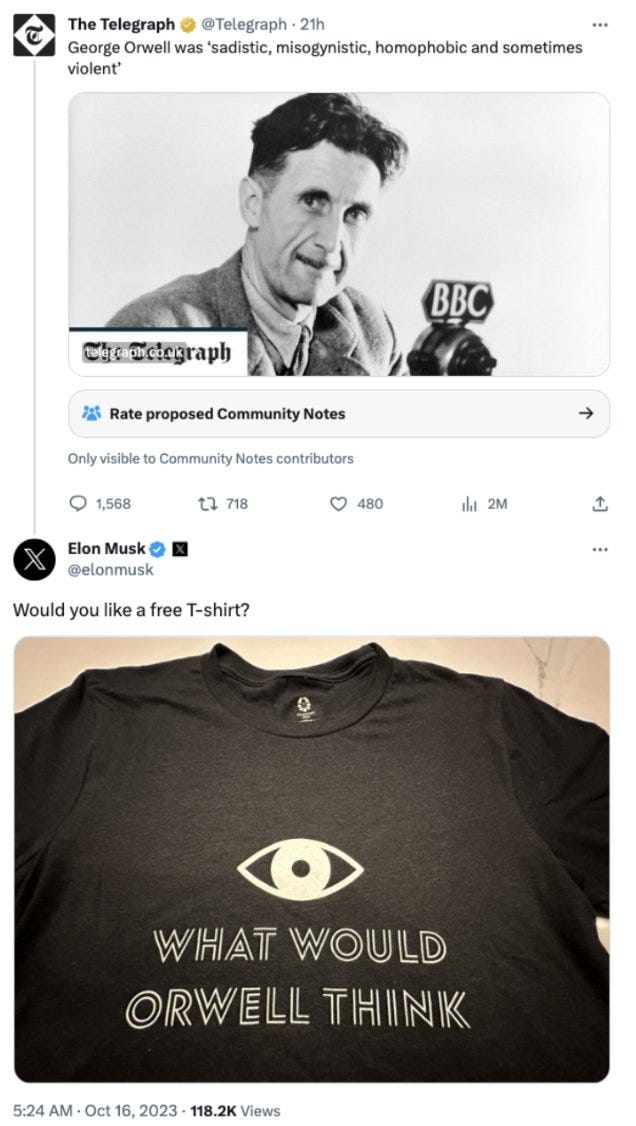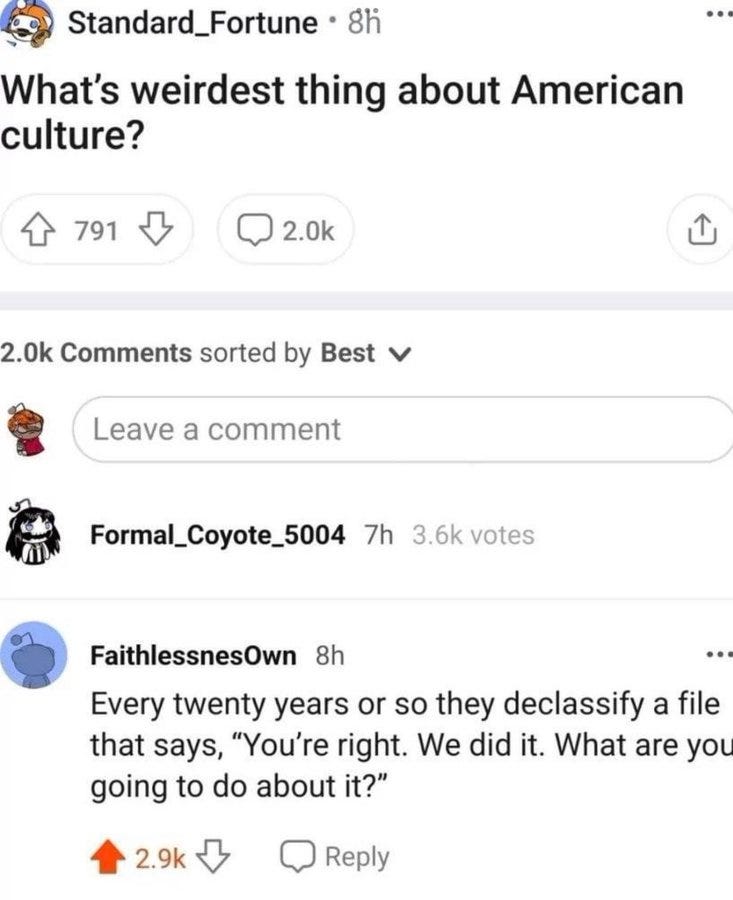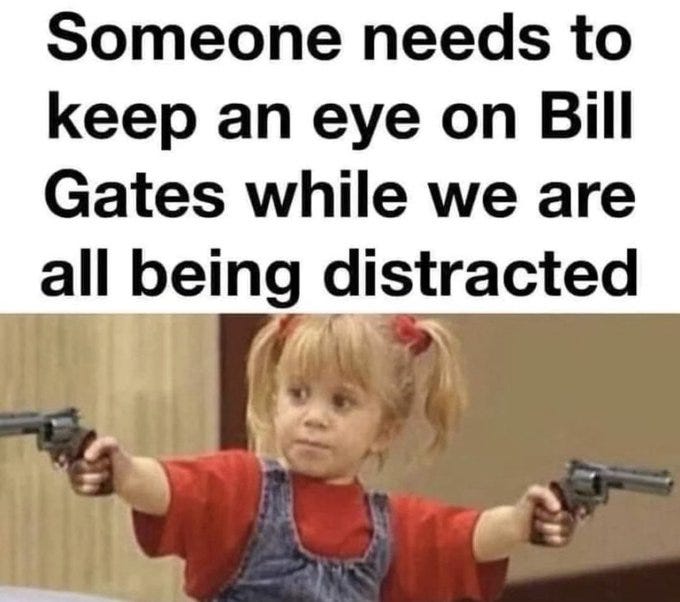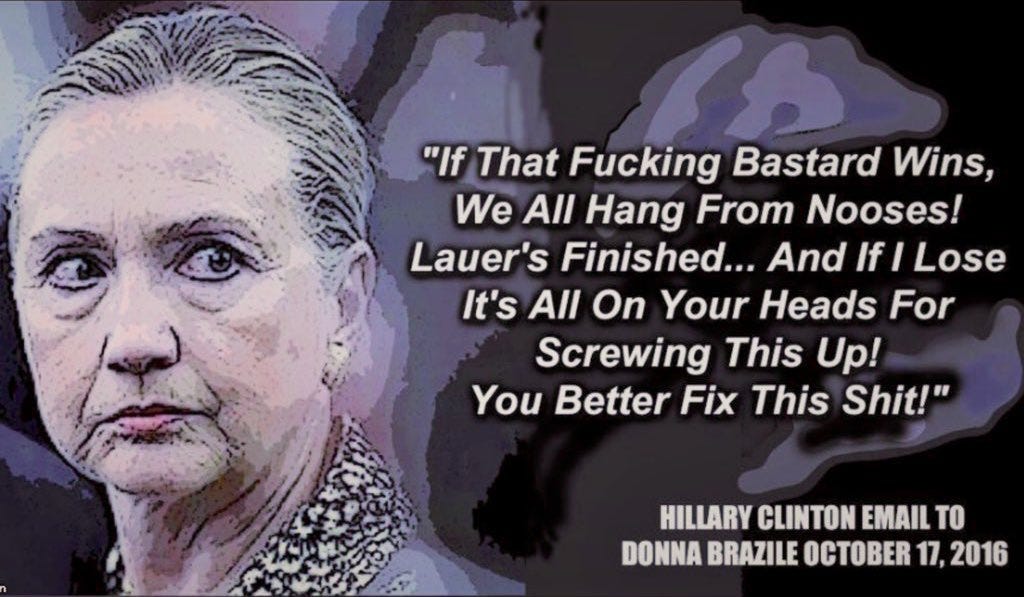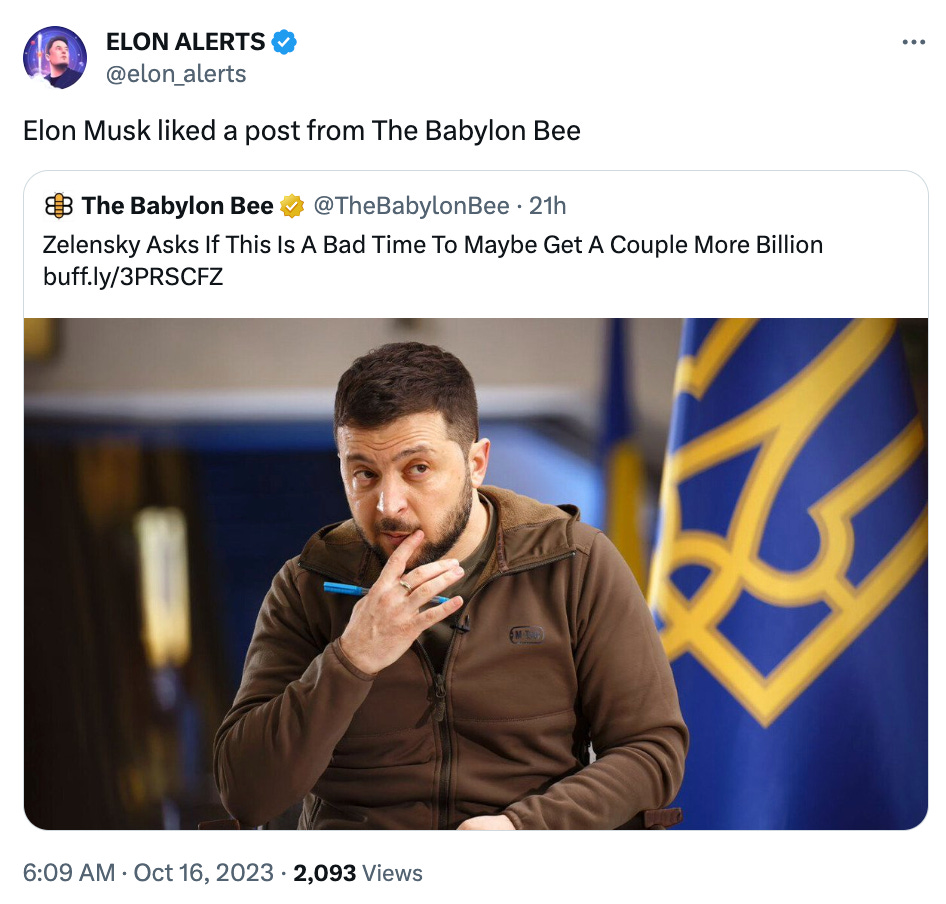Hey everyone,
This week’s digest covers the Israel/Hamas conflict, new data in the vaccine debate, and Elon’s fascination with George Orwell memes.
Don’t miss memes and news bites at the end!
Thank you for reading The People’s News for the People’s Coin.
Are you hearing about Elon Musk a lot these days?
My 𝕏 subscribers and I are reading Walter Isaacson's new biography about Elon Musk to demystify the man behind the Mars mission.
Check out this free sample post from last week to see what we’re up to, and subscribe via my profile to join our Group Read!
Bizarro World War
In the span of 10 days, the Israel-Hamas conflict has turned US politics on its head.
Conservatives who spent the last four years dealing with escalating government censorship find themselves calling on the federal government to harass far-left groups and businesses to blacklist college students for supporting Palestine.
Lefties who’ve spent the last decade calling for the censorship industrial complex to shut down hate speech are now on the receiving end of cancel-culture for the crime of having the wrong (Pro-Palestine) opinions. Free speech has come roaring back as a left-wing cause.
Support for US military intervention is another issue where two sides have made respective 180 degree turns.
The same Democrats who supported a blank check for US intervention to Ukraine are suddenly trying to bring the US war machine to a halt.
All Lives Matter, once trumpeted by the right as a response to BLM and decried as racist by the left, has now become a far left rallying cry to protect Palestinian citizens from Israeli military action.
On the other side of the aisle, anti-war America-First conservatives are facing a fresh challenge from Bush-era neocons to start another foreign intervention.
Just two weeks ago, a populist revolt within the GOP forced House Speaker Kevin McCarthy out of his job over the allegation that he made a secret deal with President Biden to continue Ukraine funding.
But McCarthy’s ouster has not deterred warmongering boomercons from trying to resuscitate the same foreign policy objectives that embroiled the US in Middle East wars for the last two decades.
On Sunday, President Biden perfectly articulated the DC Uniparty’s true objective by advocating funding Ukraine and Israel.
Yesterday, news broke that Biden would ask Congress for a new $100B military aid package for both countries.
If there was any doubt about the administration’s ambitions, Treasury Secretary Janet Yellen told an interviewer that America can “absolutely” afford wars in both Israel and Ukraine.
Outside of the beltway, a moderate and common-sense position has emerged on 𝕏: condemn terrorist brutality, de-escalate the holy war, protect children, uphold free speech, and guard the borders and interests of this country before those of any other.
This position—essentially America First—has long been derided as extreme, but listening to the chorus of voices on 𝕏, it is more an expression of the true popular will than anything the Uniparty has tried to foist on citizens.
Along with the question of American involvement, a number of parallel and sometimes intersecting lines of inquiry have emerged in relation to the conflict. Here are the five big topics from the last week:
I. Questions
Since the conflict kicked off, the biggest question has been how Israel allowed Hamas to breach its borders so easily.
Pro-Trump conservative Charlie Kirk has a reputation for supporting Israel. But over the weekend he went viral with a monologue asking how one of the most heavily guarded borders ever, backed by one of the world’s most robust defense forces, and informed by two of the most well-resourced intelligence agencies, somehow allowed a ragtag group of terrorists to paraglide into Israel and commit atrocities for hours with seemingly no resistance.
Right now, the darkest and most intriguing hypothesis is that some element in the Israeli government intentionally allowed the attack to take place as pretext to cleanse Gaza and occupy Palestinian territory.
At one point, the hashtag #BibiKnew trended, suggesting that the Israel PM had advance knowledge of the attack and let it happen anyway.
A related line of inquiry involves asking to what extent the Israeli government has intentionally propped up Hamas over the past several decades.
The theory is that Israel’s government would rather deal with a terrorist organization like Hamas than a peaceful political faction because it would justify not recognizing Palestinian statehood.
The idea is not new: it was reported by the Wall Street Journal in 2009 and The Times of Israel this year.
One of the most suggestive pieces of evidence is a 2007 cable released by Wikileaks in which an IDF officer said Israel would rather deal with a hostile state than a peaceful one.
Importantly, many of the people raising these issues are Jewish, making it impossible to dismiss their lines of inquiry as anti-Semitic conspiracy theories.
For the debate to progress, these questions need to be answered with a combination of evidence, testimony, and historical facts, not ad hominem attacks.
If left unanswered, the doubters will be further emboldened to speculate into the empty spaces that this was some sort of false flag event.
II. Information War
There are also doubts about the authenticity of information currently being disseminated to justify the conflict’s escalation.
Over the past seven days, two incidents illustrated how treacherous the informational landscape has become.
First, last week, reports spread on both social and legacy media that Hamas had savagely beheaded 40 Israeli babies.
The claim was used to bolster the case for an immediate and forceful reprisal from Israel and to justify military aid from the West. At one point, President Biden claimed to have seen photographs of babies beheaded by Hamas.
However, when challenged, the White House was forced to walk back the statement that the President had seen any photographic evidence. None of the original sources were able to provide evidence to support the claim.
The next day, conservative commentator Ben Shapiro addressed doubters of the baby claim, posting a photo of the charred remains of a child along with the commentary, “You wanted pictorial proof of dead Jewish babies? Here it is, you pathetic Jew-haters. Israel will minimize civilian casualties. But Israel will not allow the pieces of human shit who did this to live. Every ounce of blood spilled in Gaza is on Hamas.”
When the image was scrutinized for possibly being generated by AI, Shapiro deleted the post.
Yesterday, a similarly vexing series of events took place when a hospital in Gaza was bombed, killing hundreds of Palestinians.
The bombing was initially attributed to the Israeli Defense Force (IDF), prompting an outcry against Israel for its inhumane response.
Subsequently, Israel blamed Hamas, and released video showing a rocket originating from Gaza striking the hospital. Almost immediately, the origin and veracity of the video were disputed.
Last night, the New York Times presented the episode as a he-said/she-said dispute. Both pro-Israel and pro-Palestine commentators took issue with the framing.
As with any war, the fog of deception is thick. Both sides will say and do anything to win public support if they think it will further their objectives.
This has always been true, but now it is compounded by the advent of generative AI technology capable of creating images and video from text. Viewing the conflict on the Internet, it is extremely difficult if not impossible to discern the authenticity of any single piece of evidence.
The images may be genuine or fake; the only certainty is that the information war is real.
III. History
On 𝕏, there is growing recognition of the historical and geopolitical complexity of the conflict.
When wars kick off, the public is usually presented with an archetypal heroes and villains narrative involving an amoral aggressor and defenseless victim. The United States is often portrayed as being called to take heroic action to save the victim from the depredations of the aggressor.
After time passes, it inevitably turns out that the real story is more complicated.
That is certainly the case with Israel and Palestine. It’s possible to condemn Hamas’s actions and, at the same time, argue that the best long-term solution to the conflict is to give more land to Palestine people and recognize its statehood.
Last week, several videos along these lines trended on 𝕏. Here are some of the more compelling clips:
IV. Objectives
Neither side in this conflict has a history of being honest, so it is difficult to determine their sincere objectives. This week, the picture became a little clearer.
David Sacks convincingly argued that Hamas’s goal was to provoke a violent and inhumane response from Israel, inevitably drawing other Middle Eastern countries into a conflict on Palestine’s side.
Elon agreed with Sacks’s assessment, adding that the most prudent course for Israel would probably be to turn the other cheek. In another post, he wrote, “revenge is for the weak.”
The picture is a little cloudier for Israel.
Nominally, its goal is to project strength and deter future terrorist attacks, but this is difficult to square with its weak response to the initial border incursion.
A more realistic possibility is that Israel intends to use the conflict as a justification to grab Palestinian land.
A better outcome for Israel might look something like this, though things don’t seem to be headed this way:
For the US, the goal of the war is the same as it’s been for nearly a century: transfer public taxpayer dollars to private pockets of defense contractors and their political cronies. Bombard the public with pro-war propaganda long enough to get the military machine moving, after which it will become difficult to stop.
What do you think: will Israel-Palestine turn into another endless Middle Eastern adventure for the US?
V. Comedy
The vibe on 𝕏 has trended dark since the conflict started. But despite the low mood, comedy made a comeback this week.
One winning gag was Ryan Long’s depiction of an actor unsure about which country to support on social media.
Another hit was an old Jon Stewart clip depicting the fraught nature of Israel-Palestine.
A third was an infrared view proving AOC indeed farted during an impassioned speech about protecting Palestine.
The war will probably be the dominant topic on social media for the foreseeable future.
Once a war effort gathers enough momentum, it can be difficult to slow down.
What do you think it would take to stop the war machine?
Vax Uptake
Covid vaccine uptake has been steadily declining in America.
In an article published in the academic journal Vaccine in October, researchers shared data from a survey showing that only 20% of Americans received a bivalent booster. The article attributed peoples’ hesitancy toward boosters to prior covid infection and concern about vaccine injury.
More recent data shows the trend is strengthening: On October 4th, Reuters reported that less than 2% of Americans had received the latest XBB.1.5 booster, released in September.
What do you think: are Americans’ changing their minds about Covid vaccines? What about vaccines in general?
Meme Theory: Orwell
On Friday, Elon posted a couple George Orwell/1984 memes.
It's not everyday that the world's most-followed social media account shares memes about a novelistic depiction of a dystopian surveillance state. I think it’s a pretty big deal—and a sort of coded message that unlocks the zeitgeist of this bizarre moment.
Elon's message with these memes is pretty straightforward: Orwell was right
Orwell’s masterpiece is 1984. The main themes are surveillance, totalitarian government control, and manipulation of the truth.
I feel like Elon is encouraging people to question how these forces are playing out in contemporary life today.
I did a little resaerch, and found out that Elon has a strong affinity for Orwell memes. He’s been posting them like wild this year.
July was the first time he posted the “Boy did I call it” meme, when he also wrote that Orwell was "next-level Based."
He also posted this Orwell hat in July—apparently he has a thing for Orwell merch.
Then there's this one from January—again, it looks like a pretty sincere statement about the present moment.
Finally there's this exchange from May—I didn't realize his incredible affinity for Orwell memes till I started looking.
I first read 1984 in 2008.
At the time, it struck me as partly descriptive of the present, but it seemed like society had dodged the worst consequences of totalitarian control.
As time goes on though, the book feels more and more accurate. Reality is catching up to fiction
I believe Elon's purchase of Twitter/𝕏 has course-corrected us away from a totalitarian surveillance state timeline.
As long as people are free to congregate and speak freely somewhere, the Truth will win out.
Why is Elon posting Orwell so heavily right now? I can only speculate:
1) He senses a change in the zeitgeist as more people are picking up on the Orwellian vibe
2) It is a direct comment on the role of censorship, dishonesty, and state power in relation to brewing global conflict
Since Elon bought 𝕏, I've seen this platform as a countermovement to fight totalitarian censorship.
When people can freely name the evil, it loses some of its power.
The more people recognize this platform as a unique source of truth, the stronger the countermovement grows.
Importantly, the movement for truth is not partisan. It's bigger than right or left—it's about the freedom to say what one sees with one's own eyes.
Right now some people are questioning the pressure for the US to enter another war.
There's a lot of pressure on the right to issue statements of unconditional support for Israel, along with a blank check for military aid.
And on the left to support Palestinian decolonization, even if it means accepting terrorism.
I've sensed a counterweight the last few days—regular folks are leery of being lied into another middle east war.
There's also a conflict between Elon and the EU, which wants to censor 𝕏 about the war but won't give specific examples of supposedly illegal information.
Earlier this week, Elon highlighted a post about how the EU is using the war as pretext to increase censorship.
Elon not backing down from the censorship cartel—he knows whats at stake, which is civilization itself.
On Monday, things took another Orwellian turn when the news outlet the Telegraph wrote an article attempting to cancel Orwell.
The idea of the censors trying to dissuade people from reading Orwell so they can continue their censorship racket undetected is actually kind of hilarious, and reeks of desperation.
The cancellation of Orwell is probably one of the best examples of “the most ironic outcome is the most likely” ever.
Optimistically, I believe this new wave of censorship and cancel culture will fail.
Instead, it will provoke more people to awaken to the nefarious information control scheme at play in supposedly free societies
More broadly, Elon’s injunction to ask “What Would Orwell Think” is a powerful question for our times.
It encourages people to engage with the information ecosystem socratically and think for themselves, rather than blindly trusting the official sources.
It can be scary to realize that events are heading in an ominous direction, but authors like Orwell can help make sense of strange and dark times.
Great literature like 1984 crosses boundaries and speaks to people regardless of race, class, creed, or political tribe. It gives people of all backgrounds a lodestone of common meaning, and in this way creates communities of the mind.
I'd bet that despite the censors’ latest hit job, we haven't heard the last from Orwell yet—as an author and a meme.
Dogey Treats: News Bites
US Politics
Steve Scalise appeared to be the frontrunner to become the next speaker of the house, but dropped out of the race after he could not win enough votes from GOP house members. Jim Jordan is currently battling to get enough votes for the speakership. Democratic Congressman Brad Sherman floated the idea of electing George W. Bush as the next Speaker of the House.
At a rally, Trump said that Bibi Netanyahu let the US down. In a Truth Social post, he wrote “#IStandWithBibi.”
Tucker Carlson narrated a campaign ad for Trump.
New polling showed Trump leading Biden in five of six swing states when RFK Jr’s independent candidacy was factored in.
Cornel West and Alan Desrchowitz debated the war on Sean Hannity.
Global Financial System
NYT op-ed writer Paul Krugman said, “The war on inflation is over. We won, at very little cost”. Krugman was widely roasted for the post.
SpaceX
Elon: “Starlink is rebuilding the Internet in space.” STarlink launched a direct-to-cell webpage
Misc
Transgender influencer Dylan Mulvaney was honored with a “Woman of the Year” award. Elon highlighted a clip from Joe Rogan about late-stage civilization becoming obsessed with gender.
A clip of BLM founder Patrisse Cullors talking about decolonizing Palestine went viral. Elon asked who is funding BLM, which he called an “organization that spouts so much racism and antisemitism.” The ADL condemned BLM statements in support of terrorism.
AMC CEO Adam Aron said he was the victim of an unsuccessful blackmail and extortion scheme.
Memes of the Week
Elon’s memes
Thank You!
Thanks for reading! Consider sending a tip or Subscribing on 𝕏 to help keep the newsletter going!
DJ2zTEdHBD3guHLfVaNBaypr6bHFG5Nwfw
It's ALL Risky!
Thank you, kind reader, for reading and subscribing to this newsletter. I really appreciate it!
If you haven’t already, please sign up to this email newsletter for more weekly articles like this one. Also, please share it with a friend or on twitter if you enjoyed this article.
What do you think? What was the biggest story of the week? Let me know!
Remember, Dogecoin is risky. But then again, it’s all risky!
Follow on twitter at @itsALLrisky
Send an email to itsALLrisky@gmail.com
Send a Doge tip: DJ2zTEdHBD3guHLfVaNBaypr6bHFG5Nwfw
This article was written in collaboration with @CryptoDogDivine, give them a follow!
Don't forget to subscribe to this newsletter!
Disclaimer: This is not financial advice and I am not a financial advisor. The article above references an opinion for entertainment purposes only and it is not investment advice. Always assume that the author of the article is actively trading and that the opinions expressed may be biased towards the author’s holdings. Do your own research and consult with a licensed financial adviser before making any investment decision. Do not treat any opinion expressed in this newsletter as a specific inducement to make a particular investment. Content, news, research, tools, and securities symbols are for educational and illustrative purposes only and do not imply a recommendation or solicitation to buy or sell a particular security or cryptocurrency or to engage in any particular investment strategy. The information provided is not warranted as to completeness or accuracy and is subject to change without notice. The projections or other information regarding the likelihood of various investment outcomes are hypothetical in nature, are not guaranteed for accuracy or completeness, do not reflect actual investment results and are not guarantees of future results. All investments involve risk, losses may exceed the principal invested, and the past performance of a security, industry, sector, market, cryptocurrency, or financial product does not guarantee future results or returns. Dogecoin is a speculative and highly volatile asset susceptible to pump-and-dump schemes.
At the time of publication, Dogecoin is around $0.06 per coin.

































